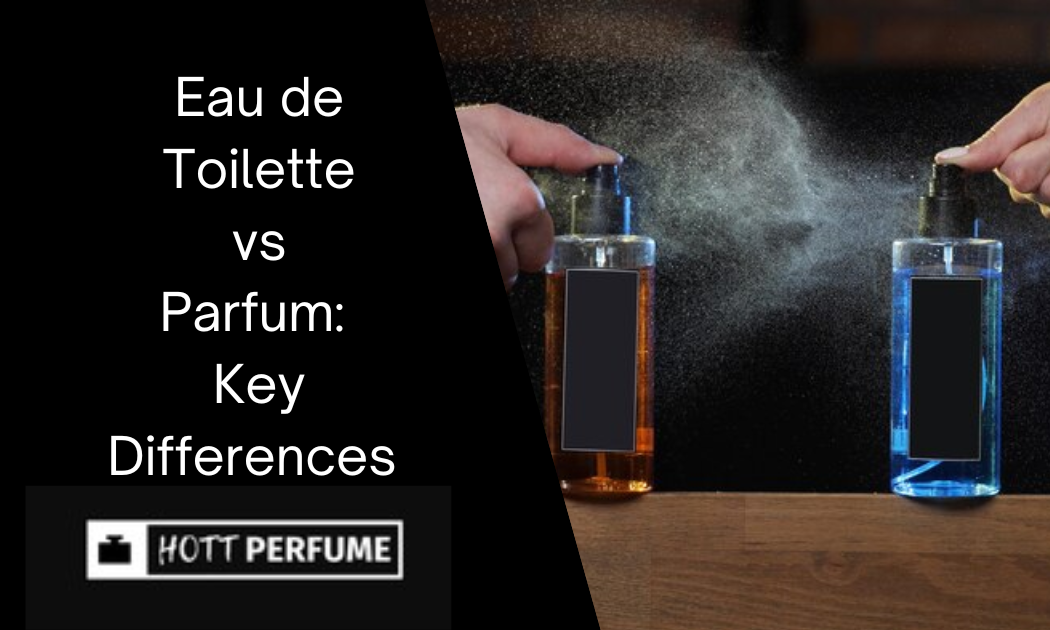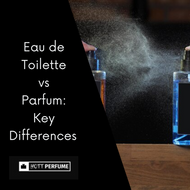Eau de Toilette vs Parfum: Key Differences and Choosing
Posted by Tina Wilson on Mar 3rd 2025

Understanding Fragrance Concentrations
Fragrance concentration refers to the amount of perfume oil in a fragrance, which directly affects the smell, its intensity, and longevity. In simpler terms, the more the concentrated fragrance of the oil, the stronger and longer-lasting the scent will be on your skin.
-
Intensity and Longevity:
Higher concentrations mean a more potent scent that stays on longer, while lighter concentrations result in a subtler, more fleeting fragrance. -
Making the Right Choice:
Understanding fragrance concentrations is crucial in choosing the right scent for your needs. Whether you’re looking for a daily wear fragrance or something more suited for special occasions, knowing how concentrated a fragrance is can help you determine its suitability. -
Range of Concentrations:
Fragrance concentrations vary widely, from eau fraiche (the lightest form) to parfum (the most concentrated). Each concentration level has its unique characteristics, offering a spectrum of experiences—from a delicate whisper of scent to a bold, enduring presence.
By familiarizing yourself with these key differences beforehand, you can confidently choose between eau de toilette and eau de parfum, ensuring that your selected parfum fragrance aligns perfectly with your lifestyle and personal style.
Fragrance Concentration Options
Fragrance concentrations indicate the percentage of perfume oil in a scent, which in turn determines its intensity of smell and how long it lasts on your skin. The options range from very light to highly, more concentrated fragrance oils, along with other fragrance types, oils, and formulas, allowing you to choose a fragrance that best suits your lifestyle and preferences.
1. Eau de Parfum (EDP)
-
Concentration: 15-20% perfume oil
-
Characteristics:
-
Offers a rich and intense scent.
-
Typically lasts around 6-8 hours on the skin.
-
-
Ideal For:
-
Evening wear or special occasions where a long-lasting, noticeable fragrance is desired.
-
2. Eau de Toilette (EDT)
-
Concentration: 5-15% perfume oil
-
Characteristics:
-
Provides a lighter, more refreshing scent.
-
Generally lasts about 4-6 hours.
-
-
Ideal For:
-
Daily wear, offering a versatile option for those who prefer a subtle fragrance.
-
Other Concentration Options
-
Eau de Cologne:
-
Concentration: 2-4% perfume oil
-
Profile: Light, often citrusy, making it perfect for daytime wear.
-
-
Eau Fraiche:
-
Concentration: 1-3% perfume oil
-
Profile: Delicate and barely-there, ideal for sensitive skin or those seeking an ultra-light scent.
-
-
Parfum:
-
Concentration: 20-30% perfume oil
-
Profile: The most concentrated option, offering an exceptionally long-lasting scent (often 8 hours or more).
-
Understanding the Strengths of Perfume: A Comprehensive Guide
Choosing the Right Fragrance
When selecting a fragrance, it's important to consider the occasion; the fragrance notes your personal style and your skin type. These factors will help determine whether you need a bold, long-lasting scent or something more subtle and fresh.
-
Occasion:
-
For special events or evening wear, a stronger fragrance like an eau de parfum or parfum might be ideal due to its intensity and longevity.
-
For everyday use or daytime activities, lighter options like eau de toilette or eau de cologne provide a more subtle, refreshing aroma.
-
-
Personal Style:
-
Your choice should reflect your personality. A robust scent can make a statement for those who prefer a bold presence, while a gentle fragrance can complement a more understated style.
-
-
Skin Type:
-
Fragrances interact differently depending on your skin. Oily skin tends to hold scents longer, whereas dry skin may cause the fragrance to fade more quickly. Choosing the right formulation and occasionally moisturizing your skin can help maintain the fragrance's intensity.
-
Factors Affecting Fragrance Longevity
Several different types of fragrance oils and factors influence how long a fragrance will last on your skin. Here are the fragrance types, different concentrations of oils and key elements to keep in mind:
-
Skin Type:
-
Oily Skin: Generally retains fragrance longer due to natural oils that help lock in the scent.
-
Dry Skin: May require additional moisturizing or reapplication since the scent can evaporate faster.
-
-
Temperature and Humidity:
-
Warmer temperatures and high humidity can intensify a fragrance temporarily, but they may also cause it to dissipate more quickly.
-
Cooler environments help maintain the scent for a longer period.
-
-
Application Points:
-
Applying fragrance to pulse points (like your wrists, neck, and behind the ears) can help the scent develop and last longer. These areas emit heat, which aids in diffusing the fragrance gradually throughout the day.
-
By considering these factors and aligning the fragrance oils of your choice with your lifestyle and environment, you can select a fragrance that not only complements your personal style but also endures throughout your daily activities. Enjoy experimenting with many different types of fragrance types and of scents until you find the perfect match that stays with you, all day long.
Perfume Expiration and Safety
-
Expiration Effects:
Perfumes can expire over time, which can alter both their scent and longevity. An expired perfume might not deliver the same aromatic experience as when it was fresh. -
Potential Risks:
Using expired perfumes can sometimes irritate sensitive skin or even cause allergic reactions. It's important to be cautious, especially if you have known sensitivities. -
Maintenance Tips:
-
Check the Expiration Date: Always look for any signs of expiration on your perfume packaging.
-
Proper Storage: Store your perfumes in a cool, dark place away from direct sunlight and extreme temperatures to help maintain their quality over time.
-
By keeping an eye on expiration dates and following proper storage guidelines, you can ensure that fragrance oils for your favorite scents remain safe and effective for as long as possible.
Applying Perfume for the Best Effect
For a rich, well-balanced, and lasting scent, it's important to apply your perfume correctly. Here are some tips to ensure you get the most out of your fragrance:
-
Target Pulse Points:
Apply your perfume to pulse points, such as the wrists, neck, and behind the ears. These areas emit heat, which helps to diffuse the scent gradually throughout the day. -
Optimal Spray Amount:
Use 2-4 sprays, adjusting the amount based on the strength of the perfume and your personal preference. This ensures that the fragrance is noticeable without being overpowering. -
Avoid Clothing Application:
Refrain from spraying perfume on clothing or fabrics. Perfumes can sometimes stain or damage materials, so it's best to apply them directly on your skin.
By following these guidelines, you can maximize your perfume's performance and enjoy a fresh, balanced scent all day long.
How to Apply Men's Cologne: A Step by Step Guide
Conclusion
Understanding the nuances main difference between eau de toilette vs parfum is essential for choosing the right fragrance to match your lifestyle. With parfum offering the highest fragrance concentration, it provides an intense scent that lasts longer—ideal for special occasions or when you want to make a bold impression. In contrast, the lower concentration of eau de toilette delivers a lighter, refreshing fragrance that is perfect for everyday wear, especially when you prefer a subtle, lingering aroma throughout your day.
Factors such as skin type, environmental conditions, and proper application techniques all play crucial roles in ensuring your fragrance remains vibrant. For many women and those with sensitive skin, selecting formulations that suit your needs and following proper storage practices can help prevent irritation and preserve the integrity of your scent. By considering these elements—from the fragrance concentration and longevity to application tips and expiration guidelines—you can confidently choose and enjoy a fragrance that enhances your personal style while keeping you fresh all day long.


